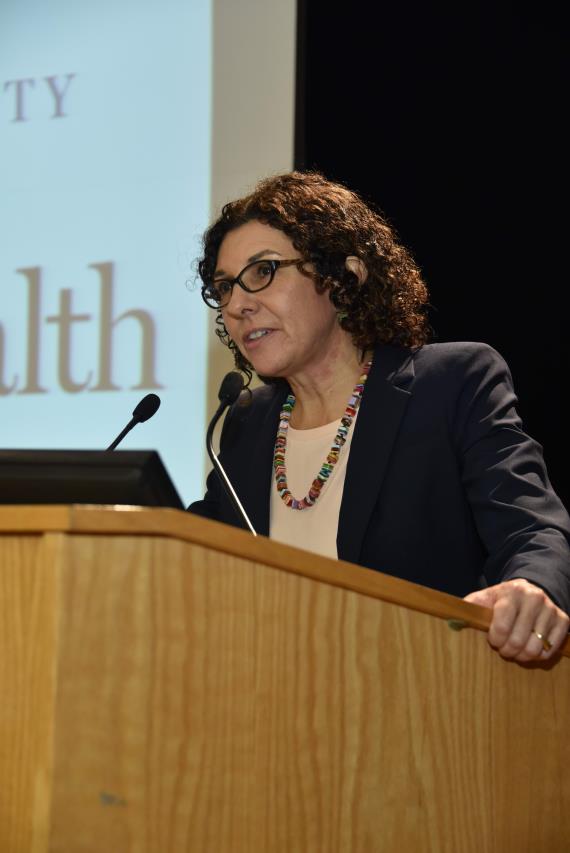Reimagining Health in Cities
By Ana Diez Roux, MD, PhD, MPH
Dean, Dornsife School of Public Health
Posted on
October 1, 2015
 Dean Ana Diez Roux
Dean Ana Diez Roux
Just a few days ago, here in Philadelphia, we had an unprecedented opportunity to reimagine our very own city. For four days on the occasion of the visit by Pope Francis, a large part of the city was closed to traffic. Residents and visitors from all over the world walked down the streets, talking and singing. Cyclists young and old traveled down the middle of Broad Street and Market Street. Bikes from the city’s Bike Share program were in use everywhere. The tables of cafes and restaurants tumbled from the sidewalks into the streets. There were sounds of talking and laughter often in different languages, and maybe the whizzing of a bike, but no horns, no cars. All of a sudden one saw the streets and the buildings along them in a new light. It was possible to discover something new at every corner, something beautiful or unique that was not visible before. It made me wonder about the health impact of this new city: what might happen to asthma rates, to traffic-related injuries? How much more physical activity were people getting? What about the subtle benefits on stress and mental health of a new type of social interactions and just seeing unexpected beauty where we live? Cities, the way we design and operate them, the way we distribute resources within them are of our own making, and it is within our power to transform them.
It is an exciting time to be thinking about the future of health in cities. Cities large and small continue to grow all over the world and a large proportion of this growth is occurring in Asia and Africa. In the United States over 80% of the population lives in urban areas, and it is estimated that 2/3 of the world population will live in cities by 2050. City living can have both positive and negative effects on health: it can increase access to resources and services and provide opportunities for positive social interactions, innovation and creativity. But city living can also engineer healthy lifestyles out of our daily lives, and expose residents to adverse environmental exposures, poor housing, stressors, and discrimination. Most importantly, the simple fact that such a large proportion of the world’s population is concentrated in relatively small geographic spaces offers cities a remarkable opportunity to improve population health.
Thanks to the generous gift from Dana and David Dornsife, our School, the Dornsife School of Public Health at Drexel University, is redoubling its commitment to improving health in cities. We do this here in Philadelphia, through our connections to our neighbors and community partners and through collaborations with the Philadelphia Department of Public Health and many other organizations in the region. But our local commitments are linked to improving the health of people living cities all over world—we know that cities share many of the same health problems and that we can learn from each other. We see ourselves as part of a global network aimed at improving the health of city dwellers across the globe through research, practice and policy translation, and partnerships.
The recent symposium hosted by our School -- Reimagining Health in Cities: new directions in urban health research and action -- is a perfect example of how we can come together to improve health in cities. The symposium brought together a stellar set of speakers and nearly 300 participants from all over the world. We heard from public health leaders from New York City, Baltimore, Los Angeles, Philadelphia, and the Americas as a whole. We learned about novel data and tools that we can use to better understand health in cities, the drivers of health, and the impact of policies. We were challenged to rethink the ways in which urban planning and health are closely entwined, and the implications for policy and practice. And last but not least, we were reminded of the critical importance of partnering with communities and policy makers.
Our goal to improve health in cities is closely linked to the founding principles of our School: that health is a human right and that social justice is critical to improving population health. All city residents have a right to the many health benefits a city can offer: access to healthy foods and places to be physically active, streets that are safe and free of pollutants, green spaces to play and relax in, high quality education and health care services, opportunities to interact and socialize, and to cultural activities and creative opportunities. We know that cities often exhibit large social and spatial health inequalities. This is why the elimination of health inequities is also so core to our mission.
We at the Dornsife School of Public Health invite you today to come on a journey with us, to reimagine health in cities, to work together to create a city that is more livable, more fulfilling, and yes, healthier for all.